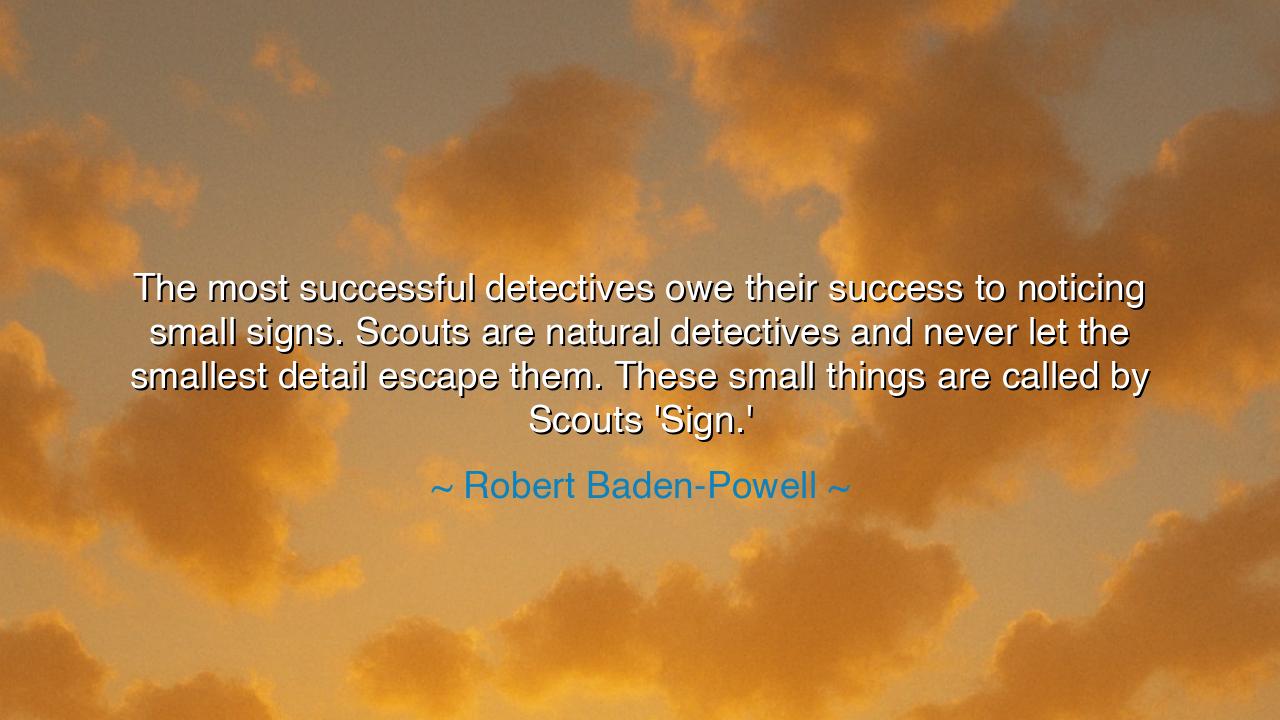
The most successful detectives owe their success to noticing
The most successful detectives owe their success to noticing small signs. Scouts are natural detectives and never let the smallest detail escape them. These small things are called by Scouts 'Sign.'






Hear, O children of watchfulness, the words of Robert Baden-Powell, founder of the Scouts, who declared: “The most successful detectives owe their success to noticing small signs. Scouts are natural detectives and never let the smallest detail escape them. These small things are called by Scouts ‘Sign.’” These words are not mere instruction for the woods alone, but a call to awaken the eye, the ear, and the spirit to the hidden truths of life. For in the smallest signs lie the greatest revelations, and in the details neglected by the careless, the wise discover victory.
Behold how detectives and scouts alike are bound by the same law: to see what others overlook, to hear what others dismiss, to perceive what others pass by. The world is full of signs, faint yet powerful, that whisper of truth to the one who is patient enough to notice. The footprint half-buried in dust, the bent blade of grass, the flicker in a man’s eye—these are the keys that unlock mysteries. Thus, the sage teaches us: life reveals itself to those who attend to the smallest things.
Consider the tale of Sherlock Holmes, though a figure of fiction, yet an enduring image of this truth. His power was not sorcery, but observation. Where others saw nothing, he saw a thread. A scratch upon a watch told of neglect, a drop of mud spoke of a journey, a misplaced word revealed deceit. His greatness lay not in grand gestures, but in the relentless reading of small signs. And though Holmes is but a character, his craft was modeled on the real powers of perception that any soul may cultivate.
Nor is this lesson confined to the detective’s art. History speaks of generals who turned the tide of battle by discerning a sign unnoticed by the enemy: the shifting wind that would carry arrows farther, the hidden path through the forest that led to victory. Hannibal, crossing the Alps with his army, survived not by brute force alone, but by heeding the smallest details of terrain, weather, and movement. It was not the mightiest who triumphed, but the most observant.
So too in daily life: the wise parent perceives the small shadow in a child’s eyes and understands sorrow before words are spoken. The faithful friend notices the trembling hand and knows his companion’s hidden fear. The careful worker observes the faint crack in the foundation before the house collapses. In all things, the smallest signs foretell the greatest outcomes, but only the watchful will see them.
What then is the lesson? Train thy senses as a Scout trains in the field. Look deeper, listen longer, and attend to what seems insignificant. Practice noticing what others ignore—the way a man speaks, the changes in the sky, the tone of silence in a room. Write down the signs you see, reflect upon them, and let them teach you the hidden currents of the world. For in such practice, you sharpen not only your eyes but your spirit, becoming a true detective of life itself.
Practical wisdom demands this: slow your steps, sharpen your focus, and resist the rushing blindness of the age. Spend a day observing nature; watch how the birds move, how the wind bends the grass, how the ground speaks of passing feet. Spend another day observing people, not to judge but to understand. Notice the signs, and let them reveal the truth beneath appearances.
Thus, I charge you, beloved: be ever as a Scout—awake, attentive, discerning. For the careless see only what is loud and obvious, but the wise see what is quiet and hidden. And in those small signs, invisible to most, lies the map to success, the shield against danger, and the key to wisdom.






AAdministratorAdministrator
Welcome, honored guests. Please leave a comment, we will respond soon